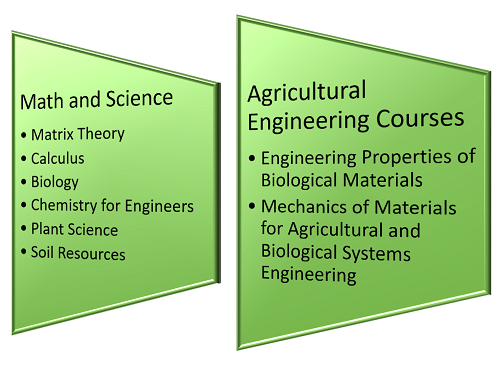Where does farming intersect with the high-tech field of engineering? Engineering refers to the application of science and math principles to solve problems, and the farming industry is full of problems to solve. Some of the challenges agricultural engineers tackle including designing more efficient farming machinery and facilities, developing better ways to supply power to farming equipment and to store and process agricultural products and addressing issues with pollution, according to the United States Bureau of Labor Statistics (BLS). To become an agricultural engineer, you will need to take plenty of classes in science, math and engineering design.
Math and Science Requirements in Agricultural Engineering
Any engineering program accredited by the Accreditation Board for Engineering and Technology (ABET) includes a minimum of one year – or 32 college credits – of study in math and science. The reason for this requirement is because engineers need a thorough understanding of math and science concepts before they can put those concepts into practice designing engineering solutions.
As far as math requirements go, students in an agricultural engineering program are likely to take classes in differential equations and matrix theory as well as calculus coursework in increasing levels of difficulty. The basic science courses needed for a degree in agricultural engineering include a combination of studies in chemistry, physics and biology.
In addition to a general laboratory chemistry course sequence, agricultural engineering students might also take more targeted classes, like chemistry for engineers. Physics courses might include mechanics, electricity and magnetism, thermal physics, optics, waves and modern physics. Biological science coursework might start with an introductory course, such as principles of biology, fundamentals of biology or general laboratory biology. The agricultural and biological engineering classes students take later on in their curricula will build on the knowledge they gain from this basic biology coursework. Students of agricultural engineering programs may also take agricultural science courses, such as plant science and soil resources.
Other common non-engineering courses for students of agricultural engineering include economics, business and public policy, according to the United States Bureau of Labor Statistics (BLS).
Agricultural Engineering Courses
More than a third of your undergraduate education will be spent studying engineering science and engineering design in your field of interest. For students of agricultural engineering, that means a year and a half of coursework in subjects like engineering properties of biological materials, instrumentation for agricultural and biological systems engineering and mechanics of materials for agricultural and biological systems engineering. Often, students start off learning the basics of the engineering discipline with an introductory course in biological engineering and agricultural engineering.
Agricultural engineering may sound like a fairly narrow field of study, but in fact, it encompasses a wide variety of projects, according to the BLS. Many agricultural engineering programs allow students to choose an area of specialization so that they can further focus their education. Your specialization or concentration within the field of agricultural engineering will affect the courses you take. For example, a student with a concentration in machine design will take more coursework in instrumentation and controls, power systems design, kinematics, dynamics of machinery and dynamics and control of engineering systems. On the other hand, a student focusing on soil and water resources will study irrigation and drainage systems engineering, groundwater engineering, animal waste management and nonpoint source pollution control engineering. Other popular specializations in agricultural engineering include test engineering and animal production systems engineering.
Your classroom studies make up just part of your education. You also need to gain hands-on experience applying the concepts you have learned to the development of engineering designs. Laboratory science projects and fieldwork play an important part in an agricultural curriculum. A major design experience, such as the design of a new robot to perform agricultural tasks or a new irrigation system, is a requirement to graduate from an ABET-accredited program. Taking part in engineering competitions that require the design of new equipment is another way to gain valuable experience, according to the BLS. An internship or cooperative program can also help you get on-the-job training in agricultural engineering as you work toward earning your degree.
Students who graduate from an ABET-accredited agricultural engineering program should be able to put engineering principles into practice in a field like agriculture, aquaculture, forestry or natural resources.
Additional Resources


